

"The ECB’s Lethal Inhibition" by Barry Eichengreen. Exit from comment view mode.
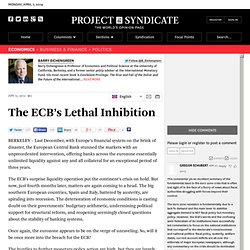
Click to hide this space BERKELEY – Last December, with Europe’s financial system on the brink of disaster, the European Central Bank stunned the markets with an unprecedented intervention, offering banks across the eurozone essentially unlimited liquidity against any and all collateral for an exceptional period of three years. The ECB’s surprise liquidity operation put the continent’s crisis on hold. But now, just fourth months later, matters are again coming to a head. The big southern European countries, Spain and Italy, battered by austerity, are spiraling into recession. Once again, the eurozone appears to be on the verge of unraveling.
The hurdles to further monetary-policy action are high, but they are largely self-imposed. But this increase in German labor costs is, in fact, precisely what Europe needs to accelerate its rebalancing, because it will help to realign the competitive positions of the northern and southern European economies. True enough. The ECB is Engaging in Massive QE.
In-depth analysis on Credit Writedowns Pro.

You are here: Political Economy » The ECB is Engaging in Massive QE By Marshall Auerback So the ratings agencies have finally followed through on the big threat and downgraded a number of the eurozone’s credit ratings, including France and Austria, both of which have now lost their coveted Triple AAA status. Italy, Portugal and Spain were downgraded a further two notches. What does this mean and why does it matter? Investors (often badly informed) use ratings agencies like Fitch, Moody’s and S&P as an indicator of default risk of a country. My take is that the ratings downgrade causes a vicious cycle in which countries will end up adopting policies that will put their economies even more at risk than they were already.
As readers of this blog are well aware, Eurozone countries have faced two types of problems by entering the euro regime that have made them unstable.
The ECB: a lender of last resort after all. From Merijn Knibbe “most present day macroeconomic analysis proceeds by imagining that people only trade physical objects with each other.
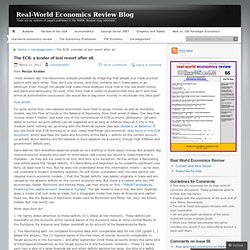
They don’t use money, and they certainly don’t make loans or go bankrupt. Capturing the ECB - Joseph E. Stiglitz. Exit from comment view mode.
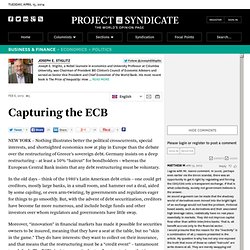
Click to hide this space NEW YORK – Nothing illustrates better the political crosscurrents, special interests, and shortsighted economics now at play in Europe than the debate over the restructuring of Greece’s sovereign debt. Germany insists on a deep restructuring – at least a 50% “haircut” for bondholders – whereas the European Central Bank insists that any debt restructuring must be voluntary. In the old days – think of the 1980’s Latin American debt crisis – one could get creditors, mostly large banks, in a small room, and hammer out a deal, aided by some cajoling, or even arm-twisting, by governments and regulators eager for things to go smoothly. But, with the advent of debt securitization, creditors have become far more numerous, and include hedge funds and other investors over whom regulators and governments have little sway. Europe’s Central Bank at Sea - Mohamed A. El-Erian.
Exit from comment view mode.
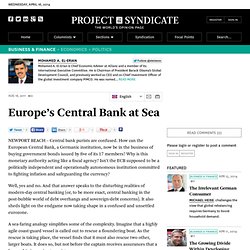
Click to hide this space NEWPORT BEACH – Central bank purists are confused. How can the European Central Bank, a Germanic institution, now be in the business of buying government bonds issued by five of its 17 members? Why is this monetary authority acting like a fiscal agency? The damaged ECB legitimacy. The European Central Bank was once known for its focus on price stability.
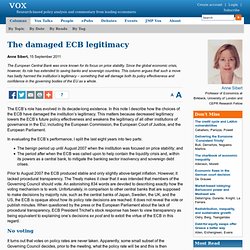
Since the global economic crisis, however, its role has extended to saving banks and sovereign countries. Bonello Urges ECB Caution in Raising Rates as Most-Indebted Nations Trail. European Central Bank council member Michael Bonello said policy makers mustn’t raise interest rates at the expense of economic growth in debt-strapped euro- area nations if inflation expectations remain contained.
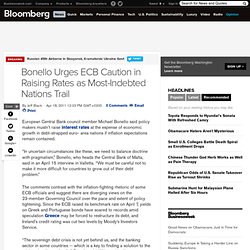
“In uncertain circumstances like these, we need to balance doctrine with pragmatism,” Bonello, who heads the Central Bank of Malta, said in an April 15 interview in Valletta. “We must be careful not to make it more difficult for countries to grow out of their debt problem.” The comments contrast with the inflation-fighting rhetoric of some ECB officials and suggest there are diverging views on the 23-member Governing Council over the pace and extent of policy tightening. Since the ECB raised its benchmark rate on April 7, yields on Greek and Portuguese bonds have soared to records amid speculation Greece may be forced to restructure its debt, and Ireland’s credit rating was cut two levels by Moody’s Investors Service.
European Central Bank council member Michael Bonello. Close. The Fateful Decision to Tighten ECB Monetary Policy. Paul Krugman notes that the Eurozone crisis began rearing its ugly head again back in April, the very time the ECB decided to tighten monetary policy.
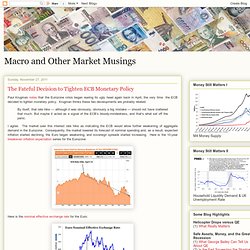
Krugman thinks these two developments are probably related: By itself, that rate hike — although it was obviously, obviously a big mistake — should not have mattered that much. But maybe it acted as a signal of the ECB’s bloody-mindedness, and that’s what set off the panic. I agree.